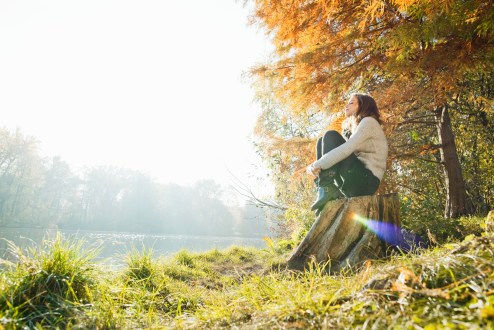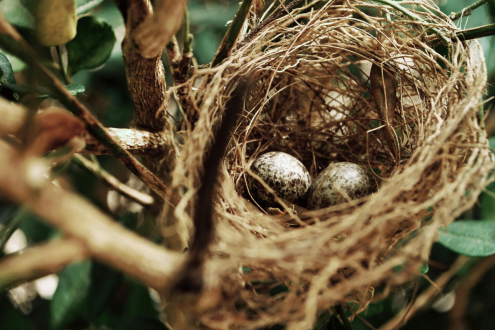Life reset 2021: personal growth tips for the new year
Ditch the new year's resolutions and perform a life reset with our new year, new you guide for personal growth in 2021

Welcome to a new year unlike any other we’ve ever entered. Traditionally, this is the season of new year resolutions, vision boards, dreams and schemes, hopes and plans. But how, you may well ask, can we do any of this when, thanks to the global pandemic, the future is so unclear.
Your life reset
Welcome to a new year unlike any other we’ve ever entered. Traditionally, this is the season of new year resolutions, vision boards, dreams and schemes, hopes and plans. But how, you may well ask, can we do any of this when, thanks to the global pandemic, the future is so unclear.
While uncertainty looks here to stay, the good news is that it’s still possible to envision a great new you in the new year, which we are calling the 2021 life reset. For this in-depth feature, we ask the experts to provide tools for getting back in touch with what truly matters. In our six-step masterplan, we offer strategies for dismantling negative old habits and draining patterns, and guidance on how to chart a fresh course towards a new you and a simpler and more meaningful new year of personal growth.
How to plan a life reset
In a world that is unrecognisable in many ways, is it futile to visualise our future and go forth with optimism? No, says Anita Chaudhuri, but we need a different approach for different times.
Usually, new year is my favourite time – and not just because I am Scottish. I love the ritual of gathering coloured pencils, stickers and all my shiny new stationery in order to create a plan of action for the coming months. The problem is that life is about as far removed from usual as I’ve ever known.
Is it even worth bothering to dream big when the future is so unclear and unpredictable? Life coach Shannah Kennedy, author of The Life Plan: Simple Strategies For A Meaningful Life (Penguin, £27,99), suggests starting from a more inspired place. ‘Right now, we need to adopt the mindset of adventure. We can’t see what the path ahead is going to be – but if we decide to look at it as a voyage of discovery, then at least we can plan for that in the new year.
The brain needs a plan for personal growth and reset – it needs instructions. Whatever is going on externally, we still need to set goals and feel as if we’re in the driving seat of our life.’ She is not, however, advocating that we go into a la-la-land state of denial about reality and how life has changed. ‘We do need to grieve the things we can no longer do. It’s healthy to express sadness over the plans that didn’t turn out as we had expected,’ she says. Kennedy recently had to cancel her 50th birthday party, a holiday in Croatia and a workshop in Spain.
‘After that though, we need to pivot. We can still be working on our big, beautiful plans, but we need to accept that they might not eventuate exactly on time. Plans may go awry but learn to view that as a detour, not a failure. And we can take smaller actions towards our overall goals for personal growth every day by simplifying and slowing the pace,’ she says. It can be easy to get caught up obsessing over bad news and the restrictions imposed by the pandemic. ‘Don’t look at what you can’t do, focus on what you can do, given the current limitations,’ says Kennedy. ‘You could do a home photo shoot, connect more with your family, arrange flowers or write a book, all without leaving the house.’

Create a meaningful year of personal growth
Don’t get lost in the big picture, focus on your day, your week, your month… and your dreams for the new year will take shape. The experts outline the journey forward, even if you don’t have an ETA.
Unravel 2020:
Anne Ditmeyer is a Paris-based designer and coach who launched her popular life map courses on Skillshare seven years ago. ‘In order to figure out where you want to go, start by creating a map of where you’ve been. If you review 2020 in your mind, it’s easy to only focus on the negative stuff. But, when drawing it on paper, people are surprised to see that they learned something new or accomplished something unexpected,’ she explains.
Drawing allows you to be playful and to access your subconscious mind for a life reset. Ditmeyer stresses that you don’t need to be artistic, and that beauty lies in simplicity. Hers has an arrow running across the centre of the page – a timeline – and a dotted line that runs up and down over it. ‘I started the year low, feeling lonely and with patchy work, then my dotted line went up when I went travelling with my father to Vietnam, then down when coronavirus struck, then up again.
Some of the problems we face are created by people thinking that they need to arrive at a certain place. But we are all on our own path and mapping is a good reminder of that.’
Turn 2021 into a treasure map:
Ditmeyer observes that maps provide clues about what you want more of in the new year and your priorities. ‘When you view your map for 2020, you may notice important things that were missing – time spent with loved ones, perhaps,’ she says. ‘
Magic can come from uncertainty – if we knew everything about how things were going to turn out, life would be less fun. Your map becomes a treasure map combined with a mind map, where you can make connections and allow for possibilities.’
The next step is to create a map for a new you and personal growth in 2021. Start by choosing an empowering word for the year. Last year, Ditmeyer picked ‘explore’. Her map featured a Courtyard of Creativity, a Museum of Collaboration, a Library of Curiosity and a Mountain of Musings. You can put anything on your map. For instance, if you dream of publishing a novel, you could create a map of destination points along the journey to your book going on sale. ‘If you feel overwhelmed about what to include, remember that the best maps are simple. Don’t wait for it to be perfect, just put down the things that are the most important. You can always tweak it!’ Once it’s complete, she recommends hanging it above your desk where it can be a daily visual reminder of where you are headed.
Harness golden moments:
When contemplating the new year ahead or a life reset, it can be easy to get derailed by dwelling on all the things that are not possible right now. ‘I have caught myself wishing I could travel and speak to large audiences again,’ says Kennedy. ‘That’s why I make it a daily practice to name the best moment of my day, what I call a golden moment. It’s about acknowledging the best thing, usually a small thing. It might be something as simple as the dog jumping onto my bed for a cuddle or the first sip of tea in the morning.’ Kennedy suggests that we treat it as a game and look out for golden moments throughout our day.
‘Gratitude cultivates a kindness within, rather than just being angry at what’s happening in the world. It’s imperative that you notice those moments and gather them because they make up the story of your day. It helps you to live in the here and now, focusing on the beauty right in front of you rather than living in your head.’ But what if you’re a high achiever who is used to heaps of excitement and rushes of adrenaline? Kennedy laughs: ‘You’re talking to the woman who had a 20-year plan before the first lockdown. My advice? Set yourself one goal for the day and one goal for the week. That’s enough! These are things that we can control.’
What do you really want in your life?
‘I often ask my clients two questions. ‘What do you want, and what do you really want?’ says Kennedy. ‘Those are often two different things. To the first, you may reply: “I want to go for dinner with my friends.” What do you really want? “I want meaningful connection.”’ Uncovering the answers to this can take a bit of digging. A helpful tool is to create a hope collage, like a vision board but with a more internal focus. The concept was designed by psychologist Shane Lopez.
If you focus on what you’re hoping for, what comes up tends to be more expansive and altruistic than the designer kitchen often spotted on vision boards. Hope tends to encompass the lives of our loved ones and our hopes for the world, rather than self-interest alone. ‘Start with the superficial, then go deeper,’ suggests Kennedy. ‘The key thing is to focus on your heart’s deepest desires, as opposed to goals that you think you should pursue.‘ Then develop strategies to achieve the goals that will make the hope a reality.
What do you want for the new year or a life reset? What defined the ‘new you‘? What is the goal? What strategy will get you there? What are the obstacles? What action can turn your hopes into reality?’ When I tried this, I made an interesting discovery. I started with ‘I want trips and adventure’ but, as I gathered images for the collage and contemplated the question ‘What do I really want’, the answer was that I wanted to spend time in nature with people I love.
Identify the energy leaks:
In order to start the new year with a clean slate, it can be helpful to identify the hidden drains, robbing you of time, energy and money. ‘Hidden drains can be insidious,’ says Kennedy. ‘Say you haven’t submitted your tax return and your bills are in chaos. It’s not something you address every day but that stuff is lurking in your subconscious and is exhausting.’
Overcommitting to demanding people and untidiness are other common energy leaks. ‘If we want to be the driver of our life and have energy, inspiration and motivation, we need to declutter the invisible stuff, including our relationships,’ says Kennedy. ‘Start making simple requests of people whose behaviour you complain about most. We tend to avoid asking for help and then, behind the scenes, make up stories about how X never helps with Y. The result is resentment, which is tiring. It’s easier to ask: “Would you book the restaurant; fold the washing; take the car to the garage?”’
You can also declutter limiting habits. Kennedy suggests doing an audit of the first and last hour of the day, the most important to upgrade. ‘Do you start the day by switching on the news and chugging coffee? What might work better – drinking water and going for a walk? Maybe, at the end of every day, you pour a glass of wine and watch TV. Does that sequence work for you or could you listen to a podcast, take a shower and meditate before sleep?’
Plan with self-compassion:
Simplicity seems to be the game-changer but it isn’t that easy to put into practice. ‘It is challenging to live a simpler life,’ agrees Divya Kohli, author of Finding Peace In Difficult Times (Watkins, £4.99). Rather than trying to eradicate our less desirable habits, she suggests a gentler approach. ‘What helped me is being my own ally. Respond to stress with kindness. For example, if we find ourselves getting caught up in other people’s dramas yet again, instead of beating ourselves up, we might ask ourselves why we gravitate towards certain people and situations – and accept that those are not necessarily wrong.’ In order to create lasting change, she advocates looking at two time frames, the short term and the long term. ‘In everyday life, do what you need to do for your wellbeing and self-care.
But if, for example, loneliness is driving you to check your phone all the time and fall into the social media trap, you could think about the long term. How would you like your social interactions to be and why? What changes could you gradually start to introduce?’ Simplicity starts with self-awareness, she says. ‘It’s about learning to zoom in and out of your circumstances. In the short term, having the cocktail and watching TV is fine – but zoom out and ask: why am I doing that? Why do I need that? Sometimes, it’s because it’s exactly what you need – but, if you’re doing it every night, maybe it’s keeping you from completing the project that you really want to finish or forging meaningful connections that will bring you closer to the life you really want.’

Top tips for a life reset during 2021
Coach and author of ‘The Life Plan’ Shannah Kennedy explains how to set intentions and slowly bring them to fruition, while being prepared for – and unafraid of – unforeseen circumstances
Set goals for personal growth
Make all the plans you like but know that they must be adaptable. Acknowledge that time scales for goals are a movable feast in 2021.
Divide the new year into quarters
Plotting the entire year is too difficult right now – but, if you plan in 12-week blocks or seasons, you have an overall game plan that allows you to take action in each segment. Think smaller picture, frame by frame.
Focus your life reset
Choose the aspects of your life that you want to overhaul this year and devote each quarter to one of them. So, for example, you could start with health from January and begin action for that, then move onto finances, then relationships and, in the final quarter, you could devote time and energy to the development of your career.
Steps to changing your life
Focus your habits around one life issue. Have a daily routine that takes you in the right direction. Breaking it down gives you a way forward that’s within your control. If your goals rely on circumstances that you can’t govern, you may end up disappointed.
How to be agile in a post-covid world
How to be agile in a post-Covid world led by Helen Burgess, helps you surrender to uncertainty and thrive. This video addresses mental health and how to cope with financial instability- and will prepare you for what’s next.
This is the first video in a series of four-week online coaching programme. We run a first-class coaching club for all for our subscribers.
To subscribe for just £15 for your first six issues, order online at shop.kelsey.co.uk
Images: Getty/iStock








